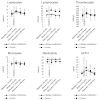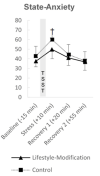Comprehensive Lifestyle Modification Influences Medium-Term and Artificially Induced Stress in Ulcerative Colitis-A Sub-Study within a Randomized Controlled Trial Using the Trier Social Stress Test
- PMID: 34768588
- PMCID: PMC8584874
- DOI: 10.3390/jcm10215070
Comprehensive Lifestyle Modification Influences Medium-Term and Artificially Induced Stress in Ulcerative Colitis-A Sub-Study within a Randomized Controlled Trial Using the Trier Social Stress Test
Abstract
Objective: The present study presents long-term results of stress-related outcomes of a prospective RCT that evaluated effects of a ten-week comprehensive lifestyle-modification program (LSM) in patients with inactive ulcerative colitis (UC). In addition, exploratory results of a sub-study applying a laboratory stress protocol (Trier Social Stress Test; TSST) conducted within the RCT are reported.
Methods: Ninety-seven patients with inactive UC were randomized to LSM (n = 47; 50.28 ± 11.90 years; 72.3% female) or self-care (n = 50; 45.54 ± 12.49 years; 70% female). Patients' perceived stress, anxiety, flourishing and depression were assessed at week 0, 12, 24 and 48. After the respective intervention, 16 female patients (LSM: n = 8; 44.6 ± 14.3 years; Self-care: n = 8; 49.25 ± 4.30 years) additionally underwent the TSST. State anxiety, blood pressure, pulse, complete blood counts, adrenocorticotropic hormone (ACTH), cortisol, adrenalin and noradrenalin were measured at baseline (-15 min), stress (+10 min), recovery1 (+20 min) and recovery2 (+55 min). Statistical significance was set at p < 0.05; for the exploratory sub-study using the TSST, p-values < 0.10 were considered significant.
Results: Patients' perceived stress declined significantly after the LSM (p < 0.001) compared with control. This lasted until week 24 (p = 0.023) but did not persist until week 48 (p = 0.060). After 48 weeks, patients' flourishing was significantly increased compared with control (p = 0.006). In response to the TSST, significant group differences were evident for pulse (p = 0.015), adrenaline (p = 0.037) and anxiety (p = 0.066). After 55 min, group differences were found for ACTH (p = 0.067) and systolic blood pressure (p = 0.050).
Conclusions: LSM has a medium-term positive effect on perceived stress. First indications show that it is promising to investigate these effects further under laboratory conditions. It is also desirable to find out how the effects of LSM can be maintained in the long term.
Keywords: Trier Social Stress Test; clinical research; comprehensive lifestyle modification; stress; ulcerative colitis.
Conflict of interest statement
A.K.K.: German Federal Ministry of Education and Research, German Crohn’s Colitis Organization, Rut- and Klaus-Bahlsen-Foundation, Kompetenznetz Darmerkrankungen; K.K., Z.C., R.E.: Nothing to disclose; D.A.: Karl and Veronika Carstens Foundation and the Federal Ministry of Education and Research; H.H.: Robert Bosch Foundation Germany, Astrid-Haugstrup-Sörensen Gedächtnisstiftung Germany, Craniosacral Association Germany, Upledger Association Germany; H.C.: Bundesministerium für Bildung und Forschung, Astrid-Haugstrup-Sörensen Gedächtnisstiftung, Software AG-Stiftung, Karl und Veronica Carstens-Stiftung, med. Erwin Braun Stiftung, EDEN-Stiftung, Professor Manfred von Ardenne Forschungsförderungsgesellschaft e.V., Familie Gerhard Wuth-Stiftung, Psychologische Praxis Dietmar Mitzinger, Wilmar Schwabe GmbH & Co. KG, Rothenfußer Stiftung; S.E.: Funded by the Deutsche Forschungsgemeinschaft (DFG, German Research Foundation)–Project-ID 422744262–TRR 289); J.L.: Was a speaker for Repha GmbH, Techlab Inc., Falk Foundation, Takeda, Celegene GmbH and Willmar Schwabe and received research funding from Repha GmbH, Techlab Inc., Falk Foundation and Willmar Schwabe.
Figures





References
-
- Langhorst J., Hofstetter A., Wolfe F., Hauser W. Short-term stress, but not mucosal healing nor depression was predictive for the risk of relapse in patients with ulcerative colitis: A prospective 12-month follow-up study. Inflamm. Bowel Dis. 2013;19:2380–2386. doi: 10.1097/MIB.0b013e3182a192ba. - DOI - PubMed
Grants and funding
LinkOut - more resources
Full Text Sources
Medical

